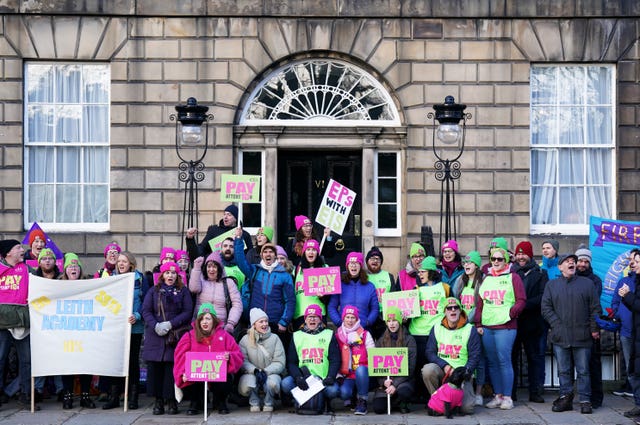Schoolchildren will miss more lessons this week as teachers take further strike action in the continuing dispute over pay.
Members of the Educational Institute of Scotland (EIS) union are beginning 16 days of rolling strike action on Monday, with teachers in two of Scotland’s 32 local authority areas walking out each day until February 6.
The first two councils affected are Glasgow, where all schools are closed on Monday, and East Lothian where they are shut to all pupils apart from those taking preliminary exams that day.
The action is going ahead after talks on Thursday involving the Scottish Government, local authority leaders and teaching unions failed to resolve the issue.

Members of the Association of Headteachers and Deputes in Scotland (AHDS) union are also beginning 16 days of rolling strikes from Monday, mirroring the EIS action.
EIS members have previously taken three days of strike action, one in November and two in January, while members of other teaching unions also walked out on those days in January and on two dates in December.
Unions have rejected a pay offer which would see most teachers receive a 5% wage rise, although the lowest earners would get an increase of 6.85%.
Scotland’s Education Secretary Shirley-Anne Somerville has insisted the 10% teachers are demanding is unaffordable.
The EIS on Friday announced a further 22 days of strike action, starting at the end of February, in an escalation of the dispute.
EIS general secretary Andrea Bradley said she hoped to get back around the negotiating table later this week.
However, speaking on BBC Radio’s Good Morning Scotland programme, Ms Bradley said there was “growing frustration” from teachers as previous talks failed to result in an improved pay offer.
She said: “Morale is high but, obviously, there’s a growing frustration at the lack of urgency being shown by the Scottish Government and Cosla to settle this dispute.
“(Teachers) are having to take strike action in freezing temperatures. This is not action that they should be having to take, it’s simply to achieve a fair pay settlement.”
She said the highest rate of the pay offer – 6.85% for the lowest paid – represents just 8.4% of teachers, many of whom fail to secure permanent work after their probationary year.

Schools around the country were shut as members of the EIS, NASUWT, Scottish Secondary Teachers’ Association (SSTA) and AHDS took strike action on January 10 and 11.
It came after SSTA and NASUWT members took two days of strike action in December while EIS members walked out on November 24.
The SSTA has warned of further strikes unless the Scottish Government puts forward a suitable pay offer.
The NASUWT said it is awaiting an improved pay offer from Cosla and the Scottish Government – but said that if this is not forthcoming, further action will be considered.
Ms Somerville said: “Strikes in our schools are in no one’s interest – including for pupils, parents and carers who have already had to deal with significant disruption over the past three years.
“It is disappointing that the EIS has proceeded to escalate industrial action – we are continuing to urge teaching unions to reconsider their plans while talks are ongoing.
“Recent discussions have been constructive. There has been a shared understanding that talks have been focused on discussing potential areas for compromise – not on tabling a new offer at this stage.
“To date we have made four offers, all of which have been rejected, but we remain absolutely committed to reaching an agreement on a pay deal that is fair and sustainable for all concerned.”
After talks on Thursday failed to resolve the issue, Councillor Katie Hagmann, Cosla resources spokesperson, said: “Cosla leaders are clear that given the financial pressures being faced it remains the case that the 10% ask of the trade unions remains unaffordable and therefore we still remain a distance apart in terms of a settlement.”




Comments & Moderation
Readers’ comments: You are personally liable for the content of any comments you upload to this website, so please act responsibly. We do not pre-moderate or monitor readers’ comments appearing on our websites, but we do post-moderate in response to complaints we receive or otherwise when a potential problem comes to our attention. You can make a complaint by using the ‘report this post’ link . We may then apply our discretion under the user terms to amend or delete comments.
Post moderation is undertaken full-time 9am-6pm on weekdays, and on a part-time basis outwith those hours.
Read the rules here